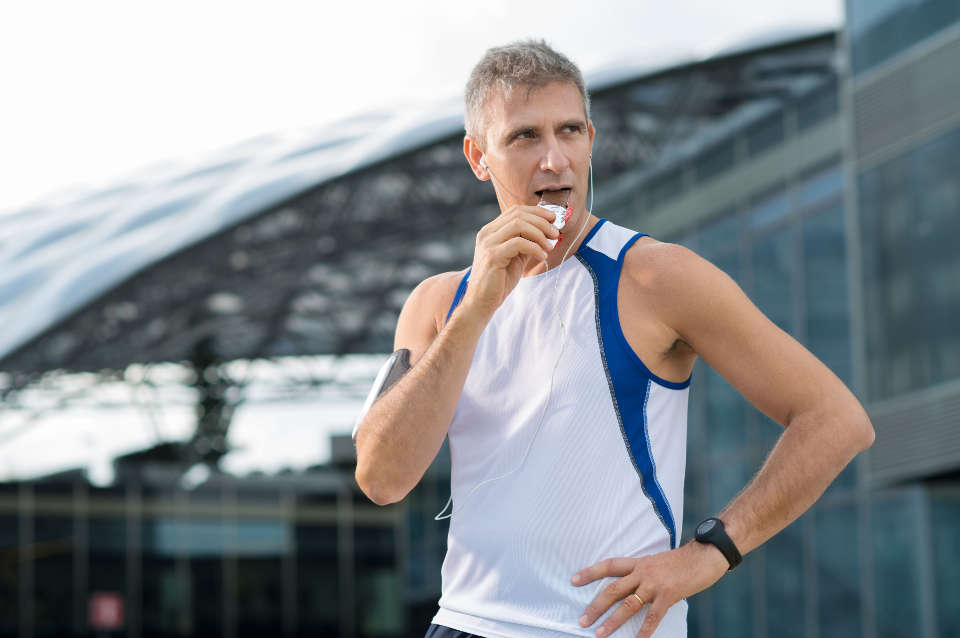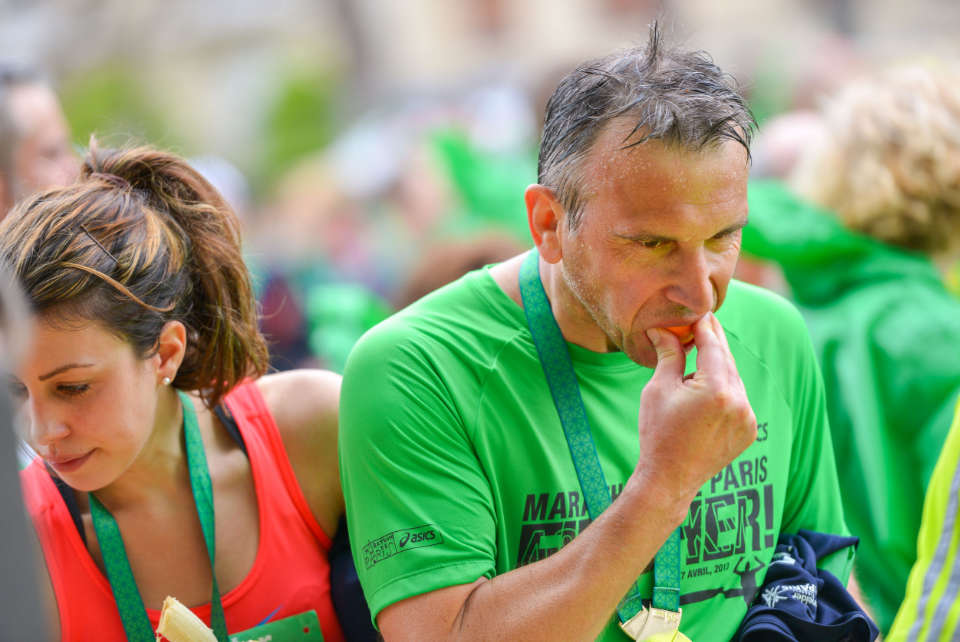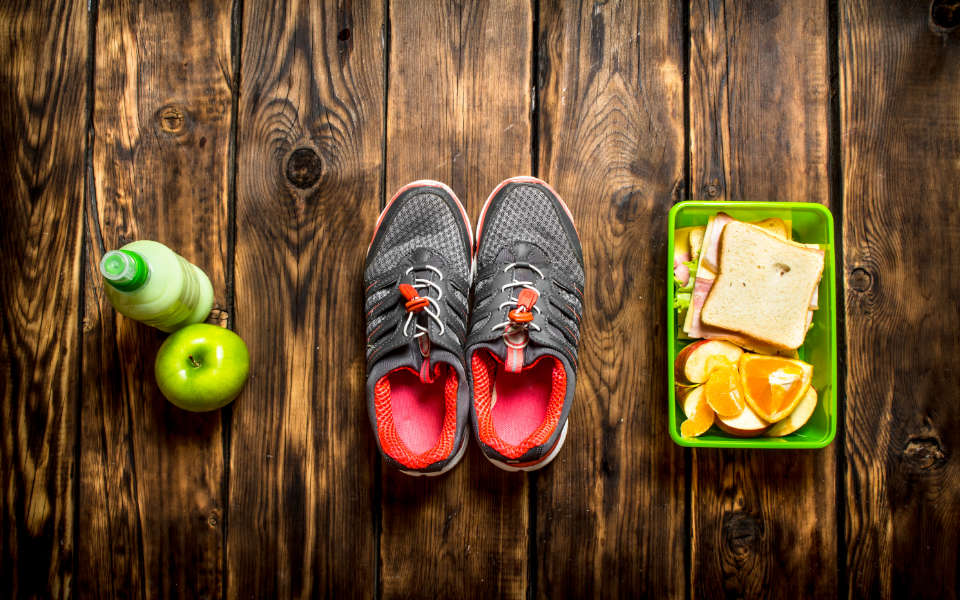Would it surprise you to learn that our bodies respond to pre- and post-race eating in distinct ways? This topic is particularly important if you factor in marathon days or if you have a condition that mandates one or the other.
When in doubt, consult your body. Whether you turn out to be a runner who’s able to train after eating or experience shows that the less you eat before you run, the better your performance, you’ll find answers courtesy of learned minds we’ve consulted on a topic that’s literally food for thought!
What feels right to you?
It’s the ideal question to ask when attacking this subject because if you experience any sort of distress when you run after eating, you can skip the rest of this article!
Assuming you don’t have a problem eating before you run, the amount of food you ingest could be a deal breaker.
Mayo Clinic researchers insist that the choice to eat before or after a run is unique to every individual because everyone’s digestive process is distinct.
It takes anywhere from 6 to 8 hours to get the same mix of food through different stomachs and small intestines, so it behooves you to figure out your own gastro-intestinal (GI) timeline.
Your physiology may force you to eat before your run because you find that you become lightheaded, sluggish and ill if you run on an empty stomach and have no energy stores remaining in your system from your last meal.
Alternately, chronic disease like diabetes may leave you with no choice if you don’t want your blood sugar to plummet.

Should I run before or after breakfast?
When to eat when planning a run is based on the runner body itself. Some runners with sensitive stomachs prefer to run first and then have a wholesome breakfast after.
Running before or after, breakfast also depends on the distance running, the intensity of the run and overall health and goals.
Researchers found no major difference in body composition of weight loss for runners who run before or after breakfast, neither suggests performance limitations for the average runner.
Should I run before or after dinner?
If you are going to run for less than an hour, you should run before dinner. One of the reasons why we eat before dinner is to provide fuel for the muscles. But the body already has a stored fuel source (muscle glycogen) that can be used in short-term, hard activities.
It’s probably better to eat after running to recover from it.
If you run too soon after dinner, you will be prone to stomach cramps, stomachaches, or gastrointestinal distress. The mechanical movements of the body that naturally occurs while running can upset the digestive tract.
It’s strongly recommended to wait three to four hours before running after eating a sumptuous dinner. Do run at least 2 hours before bedtime to avoid endorphins to get in the way of your sleep.
All runners’ stomachs are different
Every runner has a different level of tolerance on how they stomach will react after they have their meals. For example, some of the runners will reach for a peanut-butter-and-banana sandwich as their pre-workout meal. But this might not work for other runners.
You may have to try and find out what works best for you. Do take note that the closer you get to the workout or the more intense the workout, the less your body will be able to digest. So be sure to choose digestible foods that are low in fibre and fat, and rich in carbohydrates.
Does size matter?
When it comes to pre-run meals, you bet! If you’ve tried to consume a large quantity of food before running, that’s a great way to sabotage your experience. But some foods are worse than others, even in small amounts.
Chow down on dairy, refined grains, high-fat foods, too much caffeine, sugar-laden treats and high-fibre foods before running and the results won’t be pretty.
Eliminate foods in those categories, keep portions small and don’t run immediately after you put down your fork, spoon or toast to get the nutritional boost you need to start your morning, afternoon or evening run.
No time to start preparing anything that requires more than a knife or a toaster? Make up your own pre-run meals and you improve your chances of avoiding gastric distress.

Should I eat before a run?
After eating our food, our food will break down, absorbed and moved to the muscles by the blood. So the food will be useful once it’s been digested and absorbed.
It does take time for our food to become potential energy for the body. While exercising, blood transfers from the digestive tract to the muscles, leaving less blood to aid digestion.
If you plan to eat before you run, it is best to eat before one to two hours beforehand.
So that the food has the time to processed and energy can be available, it depends on what types and quantities of food you eat.
Fatty foods, proteins and fibre usually take longer to digest than other foods. After consuming foods that are high in fat and fibre (fibre is higher in fruit and grains), it can increase the risk of stomach irritation during exercise because it stays in your belly and it does not absorb.
If you consume bigger amounts of food, it can take longer to digest than smaller quantities. So, if you’re going to eat immediately before exercise, it is best to eat a small amount of carbohydrate, like a glass of sports drink.
What to eat before a run
Having a light snack before running is a good way to get through your run. It can give you the energy you needed and keep your blood sugar level from crashing.
Morning run
You must be thinking that you do not have much time to eat any light snacks before hitting the road. But if you feel that your body hasn’t had any food since the night before.
We would say it is important to consume a light snack before you run for about 30 to 60 minutes.
You can choose the foods that contain carbohydrates and protein. These are the foods below you can have it before you run:
- Banana with a tablespoon of nut butter
- Energy bar or low-fat granola bar
- Small yogurt and fruit
- Fruit smoothie
- Whole grain bagel
- Oatmeal
Evening run
If you experience hunger or fatigue without a pre-workout snack, even you had your lunch in the afternoon, then these are the best choices for you, but be sure to eat around one to two hours before you head out:
- Crackers and a cheese stick
- Energy bar or low-fat granola bar
- Half of a nut butter and jelly sandwich
Food to eat after running
After a run, your brain will start to think about what kind of food you would want to replenish your body. It is important to replace the good nutrient that you lost after your run in your body, so that your body can recover well.
Specifically, your post-run meal should contain adequate protein, as well as plenty of cabs to replenish your glycogen levels, which are your body’s storage form of carbs.
Also, you will need to include salt to replace the sodium lost in sweat. Sodium-rich foods also increase fluid retention when combined with water to restore hydration post-exercise.
These are a few of balance diet foods for post-run meal:
Salmon with rice and asparagus
Salmon is a great source of protein, but also rich in heart-healthy omega-3 fatty acids.
Due to their anti-inflammatory properties, omega-3 fatty acids can reduce the risk of heart disease, mental decline, and certain cancers, including breast and colorectal cancers.
So pairing up with rice and asparagus is a good post-race recovery meal for your body.
Greek yogurt with fruit and granola
Greek yogurt generally is much higher in protein than regular yogurt. One 2/3-cup serving of Greek yogurt packs 15 grams of protein, compared with 5 grams for the same amount of regular yogurt.
So if you add fruit and granola, it does add extra carbs, vitamins, and minerals to speed up your post-marathon recovery.
Oatmeal
Oatmeal is a high-quality carb source and rich in beta-glucan, a type of soluble fibre that have several health benefits, such as improved immune function and a reduced risk of heart disease.
Oatmeal typically enjoyed for breakfast, but also it is an ideal choice for after a marathon, particularly when loaded with other ingredients for extra protein and calories.
You can add milk and top it with sliced strawberries, bananas, or Chia seeds. Nuts, such as walnuts or almonds, as it is a good source of protein and healthy fats as well. Add honey, sprinkle on some coconut, or add dark chocolate chips for additional taste.
Penne with chicken and broccoli
Penne with chicken and broccoli is packed with healthy carbs and high-quality protein, so I would say it is a perfect combo for post-race recovery meal.
Were you diagnosed with a GI-related illness?
If you suffer from a chronic gastric disorder—diarrhea, constipation, gastroenteritis, colitis and irritable bowel disorders-you already battle demons that impact a run more than most.
Lots of runners change their diet to manage their condition, but the digestive tract may still react as stomach contents are jostled during a run, blood is diverted to muscle, fluids shift or dehydration threatens.
On the other hand, there are precautions you can take that short-circuit crises, so if you know you’re at risk, sports doctors and coaches recommend keeping a diary to track your body’s running behavior both before and after eating. Check out medications for active people battling GI disorders, too.
How to avoid cramps while running?
Dehydration is one of the main reasons for gastrointestinal (GI) discomfort in runners includes cramps, bloating, and stomachaches.
To prevent cramps during running, drink water or a sports beverage every 15 to 30 minutes while running.
Steer clear of high-fiber foods the night before and in the morning of a run. They can also lead to cramping and GI trouble.
Timing is everything
Having determined yourself to be the person who requires sustenance before running, the length of your run may help you decide just how much you’ll eat.
You need energy. But you’d prefer to skip cramps and nausea, so base your downtime between eating and running based on the intensity of your run.
If you run for an hour and push your limits, an hour’s rest between a viable snack and your first footfall is suggested. On the other hand, we suggests extending that time to between 1.5 and 2 hours.
And don’t discount the power of the energy gel when there’s no time make toast or find a banana.

Pros and cons of running before eating
Pros
- You don’t feel “weighed down” if you run on an empty stomach.
- Blood flow goes to muscles, not the digestive system.
- You burn more fat on an empty stomach while running than you do after eating.
Cons
- Hunger could ruin your run and make you grouchy and irritable.
- Running on an empty stomach could trigger muscle breakdown.
- It’s possible to experience side effects like feeling faint or even becoming disoriented.
Pros and Cons of running after eating
Pros
- You build more muscle with a snack under your belt.
- Eating before running restores the body’s glycogen faster.
- You can run further thanks to the caloric boost you get from food.
Cons
- For some runners, even small snacks trigger stomach upsets.
- You could feel bloated, experience “sloshing” or cramps if you eat first.
- Even beneficial fiber may cause distress, says University of Adelaide Exercise and Sports Science lecturer David Bentley.
Whether you are deciding to run before or after dinner or run before or after breakfast, the most important factors to consider are your personal suitability and health condition.
What’s your secret to running before or after you eat? Is it a specific snack or have you found a way to run on an empty stomach that you would like to share?
So should you run after or before after eating?
Is it better to run before or after eating?
It’s better not to eat before running if you are going for a short run. One of the reasons why we eat before running is to provide fuel for the muscles, but the body has enough stored fuel source for short-term hard activities. So it’s probably better to eat after running to recover from it.
Is it OK to run in the morning without eating?
Researchers found no major difference in body composition of weight loss for runners who run before or after breakfast, neither suggests performance limitations for the average runner. However, it is very important to consume breakfast soon after your morning exercise to replenish your body.
When should I eat after running?
You should eat within the first 30 minutes after your running to replenish your body’s glycogen stores and important to not go longer than 2 hours. Eating a proper amount of carbs and protein after running is essential. It will stimulate muscle protein synthesis, improve recovery and enhance performance during your next workout.
How many hours before a run should I eat?
It’s recommended to wait two to four hours before running after eating a heavy meal. This allows time for your food to fully digest. For smaller meal, 30 minutes – two hours after eating would be sufficient.





